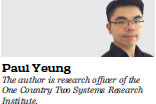Greater Bay Area initiative a boost to Hong Kong's competitiveness
Updated: 2017-04-18 06:58
By Paul Yeung(HK Edition)
|
|||||||||
Incoming Chief Executive Carrie Lam Cheng Yuet-ngor will lead Hong Kong in a new era of development. Last month Premier Li Keqiang signed a State Council decree on the appointment of Lam as the next Chief Executive. He promised that the central government would take concrete measures to promote the development of a city cluster in the Guangdong-Hong Kong-Macao Greater Bay Area, which will play to Hong Kong's unique advantages. The government delivered a clear message that the Greater Bay Area is a crucial topic for Hong Kong's future.
The term Greater Bay Area may be unfamiliar to many people. But the idea of a Guangdong-Hong Kong-Macao Greater Bay Area first surfaced in a State Council policy paper issued in March last year. It suggests the major cities in the region - including Hong Kong, Shenzhen, Guangzhou and Macao - had their own advantages and should be more complementary in future. The plan is to further foster greater economic cooperation and infrastructure development in the city cluster involving Hong Kong, Macao and nine cities in Guangdong. However, the idea of Greater Bay Area did not draw much public attention until it was mentioned in the premier's annual work report delivered at the start of the National People's Congress session last month. In the report, Li said the authorities would push on with the Guangdong-Hong Kong-Macao Greater Bay Area concept. This suggests that the plan had been elevated from a regional level to a national strategic level.

Though the idea has been frequently mentioned by the premier recently, we should not take it as a task assigned by the central government. Hong Kong should actively take part in this initiative if we realize that it is significant to the city in three ways.
Firstly, the Greater Bay Area will provide more space for Hong Kong to solve its internal problems. As we all know Hong Kong is facing some increasingly serious development issues, such as a housing shortage, an aging population and declining industries. Solutions for these problems require land resources. However, land shortage is a cold reality we have to face. According to the "Hong Kong 2030+" consultation paper, the total land requirement from now to 2040 would be a minimum of about 4,800 hectares. Even though about 3,600 hectares will be provided by planned projects, there is still a shortage of more than 1,000 hectares. Given that it is much harder to develop new land resources now than ever, the development of the Greater Bay Area may help relieve the land shortage problem to a certain extent by diverting some demand to the neighboring region.
Secondly, the plan can help enhance Hong Kong' competitiveness. Hong Kong is inevitably facing ever stronger competition from both overseas cities such as Singapore and mainland cities such as Shenzhen. The plan can provide a smart way to turn their relationships from competitors to partners by facilitating closer cooperation between Hong Kong and other cities in the region and achieving greater synergy. Moreover, a Greater Bay Area with Hong Kong can be more competitive vis-a-vis other city clusters. According to statistics, the total GDP of all Greater Bay Area members in 2015 was $1.4 trillion, double of that of the San Francisco Bay Area.
Last but not least, the plan is crucial to the future status of Hong Kong. There are questions about whether Hong Kong's core values would be compromised if it joined the Greater Bay Area. The answer is just the opposite. With the rise of other mainland cities, Hong Kong's status faces greater challenges than before. The Greater Bay Area is a golden opportunity for Hong Kong as its strategic goal is to facilitate the Belt and Road Initiative. By joining the Greater Bay Area the unique advantages, which are also part of the core values of Hong Kong, in the areas of legal system and professional services can be further sharpened. Just as the premier said, the plan would give full play to the distinctive strengths of Hong Kong and Macao, and elevate their positions and roles in the process of the nation's economic development and opening-up.
Since the plan is still at its early stage, Hong Kong should not hesitate to participate in and play an active role in the project. The work is not as easy as we thought; one main obstacle is the different systems among the various cities. Understanding, communication and discussion are necessary. Joel Barker, the pioneer advocate of "paradigm shift", said "vision without action is merely a dream". Current Chief Executive Leung Chun-ying will lead a delegation to visit Greater Bay Area cities and meet the local leaders there next week. This is a good start. It is to be hoped that more follow-up actions will come.
(HK Edition 04/18/2017 page9)